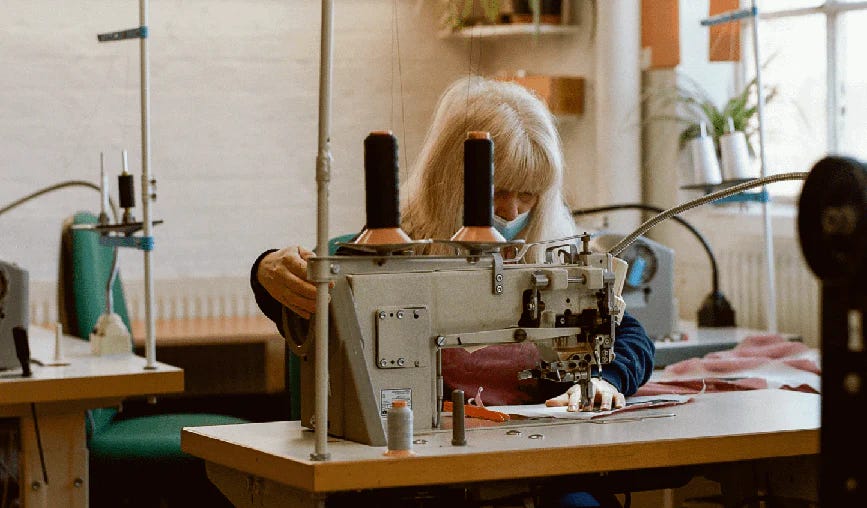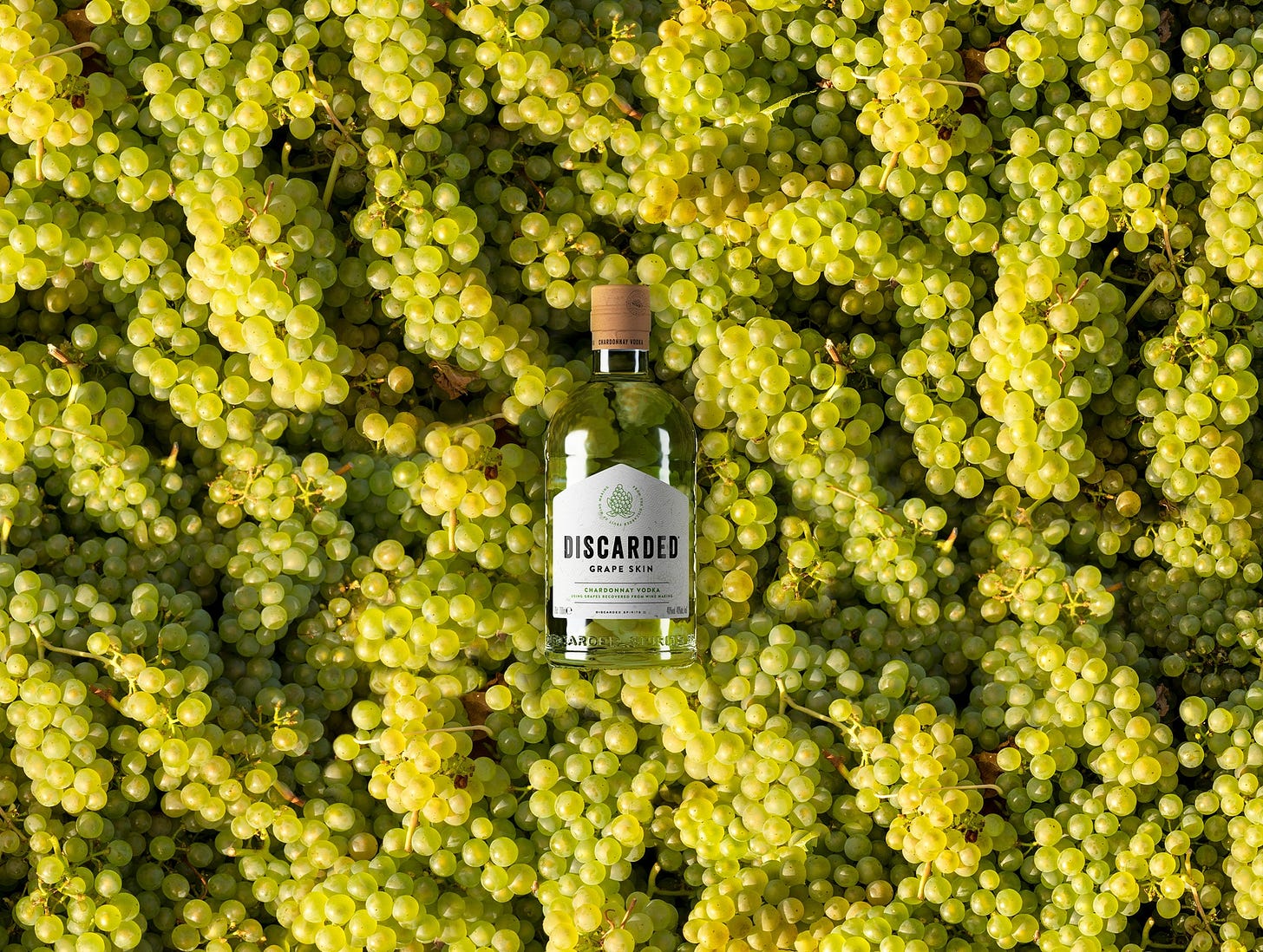🌱 Impact: BEEN London have it in the bag, but are you ready to report on it? 2023's Legal Pipeline Pt. 2.
Featuring BEEN London, Seasalt, Finisterre, innocent drinks and more...
Happy Monday!
This week we cover:
Quick Take: 2023’s Legal Pipeline: Part 2 - Impact Reporting & Guidance.
Brand Spotlight: Designing for low impact: BEEN London have it in the bag.
In case you missed it: 🌱 What's In and What's Out: The 2023 FMCG legal pipeline, and 3 waste streams Discarded Spirits are tackling.
> Good News Last Week
🎯 Seasalt funded Seeding Change Together project in partnership with the Cornwall Wildlife Trust has completed stage one of seagrass restoration in the River Fal. The 3-year study aims to understand the carbon capture qualities of seagrass.
🎯 Foodsteps announced their partnership with Sky. This will involve launching carbon labelling on Sky’s menus in addition to redesigning menus and dishes to have lower footprints and work with their suppliers to reduce environmental risks from farm to fork. The partnership will work towards achieving Sky’s 2030 Net Zero targets.
🎯 Finisterre released Sea7 alcohol-free IPA in partnership with Harbour Brewing Co. They’ve also launched Ocean Activist Masterclasses with all profits donated to the Finisterre Foundation CIC to support charitable causes that champion equal access to the ocean for all.
🎯 Italmark launched new home fragrance, “Extinction.”. The scent of flowers from Monte Baldo highlights the biodiversity risk of the Italian alpine flora, of which 40% is found on this mountain’s slopes and increases consumer awareness to preserve fragile ecosystems. Part of the proceeds will be donated to Cooperativa sociale Il Ponte, which works to safeguard the mountain and manages a botanical garden located at its base.
⭐️ Tesco announced plans to collect and recycle coastal plastic collected from beaches, coastlines and coastal communities around the Mediterranean for use in their fresh fish packaging. The packaging will contain at least 30% recycled coastal plastic and will remove around 500 tonnes of plastic from the environment each year and reduce the amount of “virgin” plastic required in the packaging.
⭐️ PepsiCo Portugal announced an investment of €7.5 million to construct a new biodigester, which will turn organic waste into biogas. The biodigester will also contribute to reducing gas consumption to achieve a 30% reduction in carbon emissions.
⚡️ The UK’s Competition and Markets Authority launched an investigation into environmental claims made about household essentials. The regulator will be examining the accuracy of environmental claims made for fast-moving consumer goods (which include food, drink, toiletries, cleaning products and personal care items).
> Click on each link to read more.
> Quick Take
2023’s Legal Pipeline: Part 2 - Impact Reporting & Guidance.
See Part 1: Let’s start with annual reports & carbon report requirements.
We’re back with another look at this year’s legal pipeline, as we get fully stuck into Q1 2023. Gone are the distant memories of roast dinners and tubs of celebrations that have now been replaced with multiple cups of coffee and slide decks containing year goals and KPIs.
Alongside this, if you’re in the sustainability industry, a large company or a B Corp, you may be thinking about prepping for your annual sustainability report. Or maybe you want to voluntarily share with the world all the incredible things your company did in 2022. Either way, we’re here to help you focus, structure and share the ropes on impact reporting.
What is an impact report?
A Sustainability report, more often now referred to more generally as an impact report, is a way of businesses externally showcasing all of the things they do to make a positive impact across environmental, social and economic parameters.
Why are impact reports useful?
If done correctly (and by ‘correctly’ we really mean ‘honestly’), reports like these are incredibly useful for a multitude of reasons:
They enable companies to be more transparent around risk, including managing and mitigating;
They demonstrate credibility (with more and more demand for this, we see this as a real shift driver in 2023);
They show progress over time (reducing risk of greenwashing and empty claims);
They help to attract more capital, investment and revenue;
They showcase company values and purpose, which attracts and retains talent;
They may motivate others (be that employees, customers or even competitors) to be better (we think innocent drinks does a great job at this);
And finally, it can aid companies in compliance (more on that in our companies house reporting here).
Who should complete an impact report?
We believe that all businesses should report on their impact on people & planet, if done so with rigour and honesty (no greenwashing here thank you). The benefits of reporting, even if it remains internal, far outweigh any potential downside. However, we believe it is especially important for high impact, high influence and high intensity businesses to do so. This is because these are the businesses, and sectors, that need to lead, drive and make the largest changes. Sustainability reporting holds these companies accountable.
Are there standards to follow?
Yes, and no. If an impact report isn’t a mandatory requirement for your business, technically you can write, and include, whatever you want. However, if you are a B Corp company, or if you officially align to the Global Reporting Initiative (GRI), there may be specifics you must include or follow. We would recommend checking this before you get started.
What should be included & where should I start?
What you include in your report will vary slightly, depending on your business model/industry, if you have to follow specific standards, where you are on the journey (e.g. tracking against baseline years/KPIs) and your wider, longer term strategy. However we believe a great place to start is by following the original pillars of sustainability (Environmental, Social & Economic), and checking out other impact reports for inspiration. Here are some to get you started: Pip & Nut, the Collective Dairy, Bloom & Wild, Burberry and GANNI.
> Brand Spotlight
Designing for low impact: BEEN London have it in the bag.
What do regenerated fishing nets, discarded apple skins and recycled IKEA uniforms have in common? They’re all materials used to make BEEN London’s bags.
Founded by Genia Mineevia in 2018, the fashion brand has been challenging the industry’s poor environmental and social reputation by incorporating sustainable design and manufacturing principles to create virgin material free, timeless bags and accessories. Let’s explore how they do it...
One woman’s trash is another woman’s treasure
The all-female team is obsessed with waste. It’s at the heart of their products, from the materials sourced, to their design and end-of-life. It’s all diligently thought through to ensure there’s as little environmental impact as possible. A short walk from the studio in East London, is one of the capital’s last bag makers, where BEEN London manufactures theirs. Here, you’ll find recycled polyester, cotton, leather, and pineapple leather as well as the aforementioned materials being sewn together to make high quality products (see more about the materials they use here).
“Our approach is simple. Instead of creating products and then solving the problems that arise, we find an environmental or a social problem, and create a solution to it”
Opting to only design bags from square and rectangular panels has challenges but ensures there are no offcuts at manufacturing level. Functional and durable, the bags are built to be used everyday. They’ve also ensured the materials they’re working with come with the highest certifications - bluesign Product, Global Recycled Standard, GOTS, OEKO TEX Standard 100 and more.
Finally, once the bags become a little too loved, consumers can return them to be repaired, free of charge. Any parts that can’t be mended are recycled so nothing goes to landfill.
BEEN London’s impact - good for the planet and people
Cradle to Gate analysis, as part of a Life-Cycle Assessment undertaken by Terra Neutra, revealed that BEEN London’s Columbia Crossbody bag had a carbon footprint 87% smaller than that of any other high-street bag, equivalent to leaving your lights on for nearly half a year! Going one step further, Terra Neutra have also built the BEEN London a tool which allows them to analyse the impact of any potential material they may introduce to their line too - helping them be conscious of their CO2 impact as they grow.

Local manufacturing was pivotal in achieving this and has championed the skills of local people. MailOut - a social enterprise based in Camden - who employ Londoners with learning difficulties manage their packaging and logistics, further underlining BEEN London’s commitment to their community. From East London, the bags are delivered across the capital by zero emissions transport via HIVED or by sea.
What is more, beyond the UK, they have partnered with non-profit organisation Tree-Nation to help with reforestation projects, specifically in the Peruvian Amazon via a Peru-based NGO called Camino Verde. With every purchase, BEEN London will plant a tree. To date, this stands at almost 800 trees - read more about it here.
Take a closer look at BEEN London:
> In case you missed it
🌱 What's In and What's Out: The 2023 FMCG legal pipeline, and 3 waste streams Discarded Spirits are tackling.
Featuring Discarded Spirits, ManiLife, Mindful Chef, eBay and more...
> Follow up with…
Article: 68 Business sustainability statistics (relevant in 2023)
Article: Building A Great Brand: How To Embrace The Impact Brand Model
Podcast: The Making of an Impact Report, with Annie Agle of Cotopaxi




